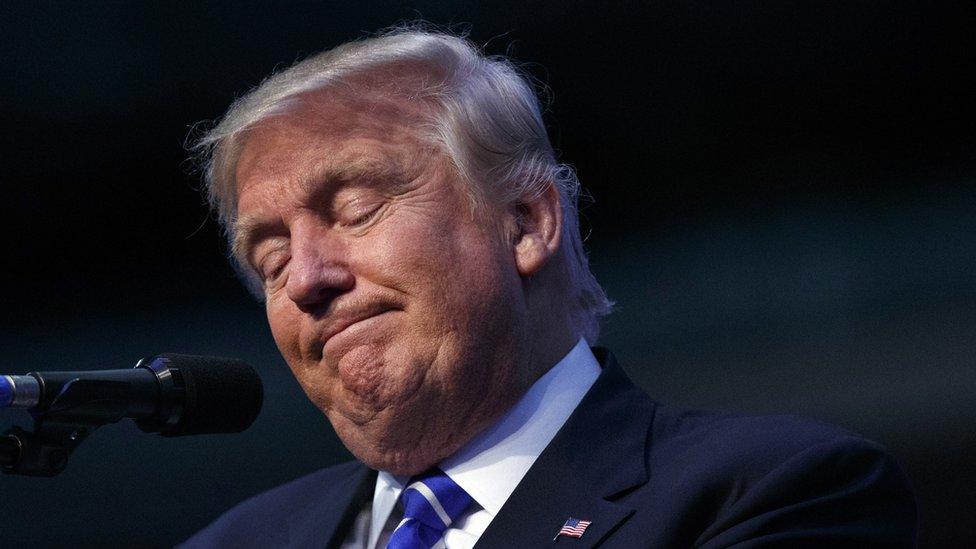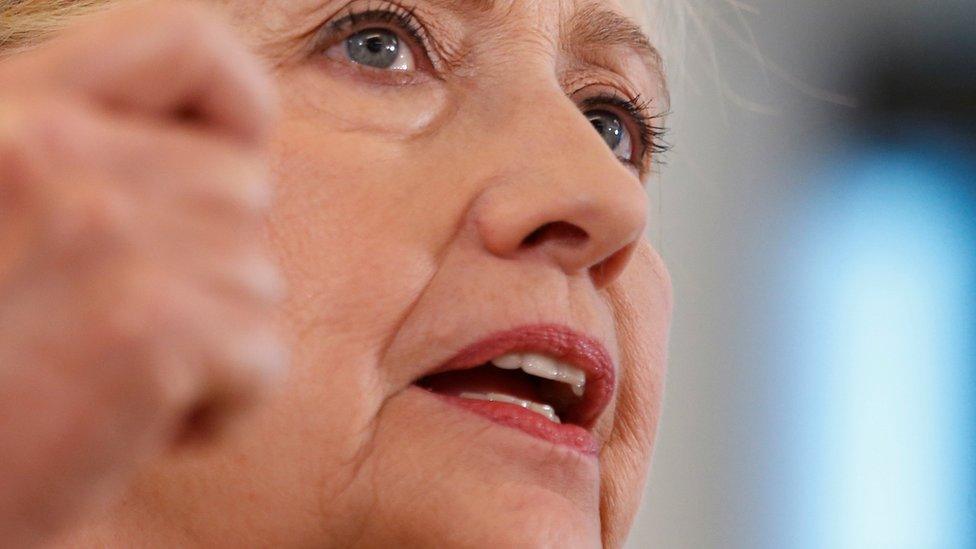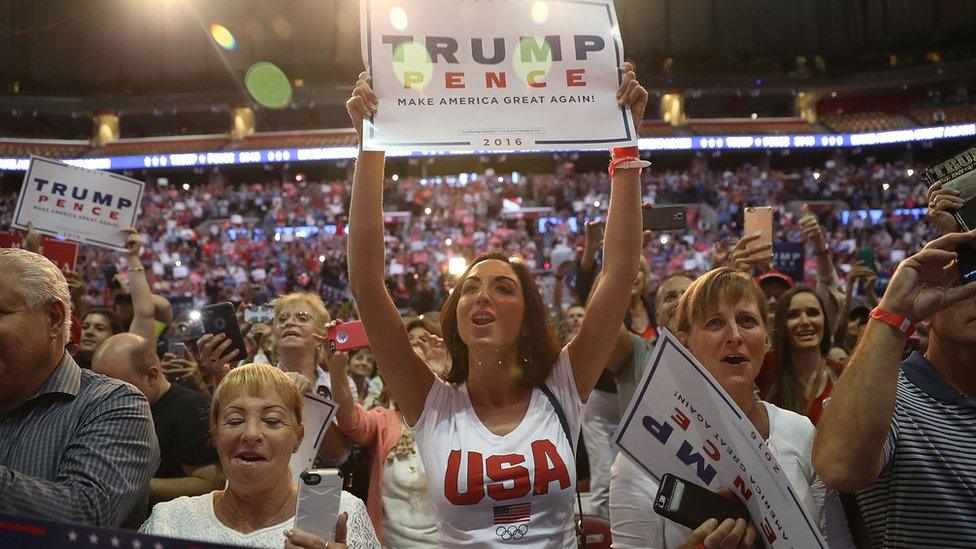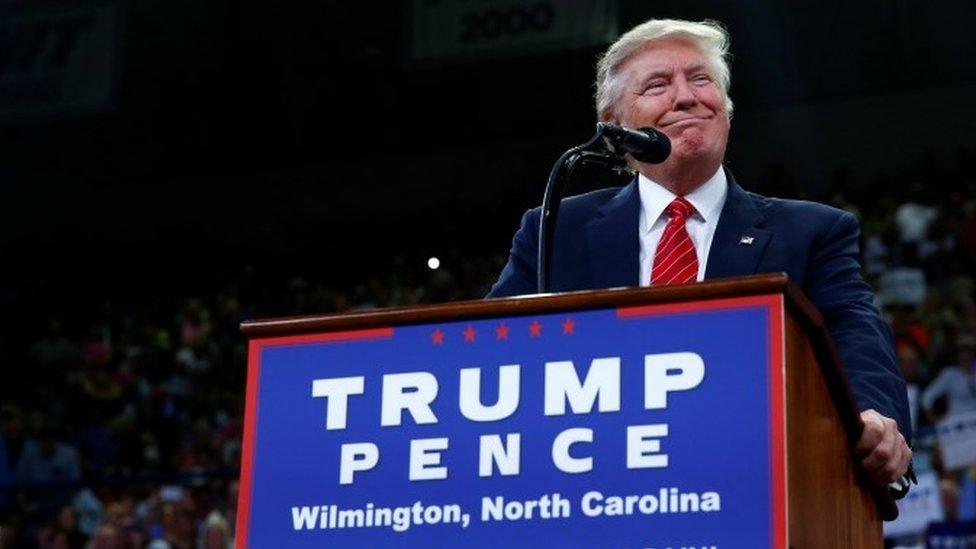The enigma that is Donald Trump
- Published

Donald Trump revels in not being like other presidential candidates. He is the outsider, the underdog, a rule-breaker who blames the experts for what he calls the "mess".
Yet with fewer than 100 days to go to November's election, there is an enigma about one of the most extraordinary campaigns in American history. What is the candidate's strategy for winning?
Mr Trump has picked unwise damaging fights, most notably with the parents of a Muslim-American soldier killed in action. He did it not only for one day but four. It raised questions not just about his judgement but his political antennae.
Earlier this week I watched him at the Detroit Economic Club. The speech was billed as a "campaign reset".
He was careful, disciplined and stuck to his prepared text. Even when he was interrupted 14 times by protestors he ignored them and you could almost see him wrestling with his own instincts to go after them, as he had done previously.
His speech, which offered tax cuts, less regulation and a promise to put America first in any trade deals, was intended to appeal to the Republican Party - to heal rifts with senior officials and politicians who he needs to campaign for him after Labour Day.
He promised to start "a great national conversation about the economy".
"I want to jump-start America," he declared and in true Trump style added "and it won't be that hard."
And then a day later came his throwaway remark about gun owners' rights as guaranteed by the Second Amendment.
He told an audience in North Carolina that if Hillary Clinton "gets to pick her judges, nothing you can do folks". A few boos from the audience seemed to egg him on and he added "although the Second Amendment people - maybe there is, I don't know".

Hillary Clinton condemned Trump's comments regarding the Second Amendment
You can see a man behind him take a sharp intake of breath. Some said it could almost be interpreted as a death threat against Hillary Clinton. She herself later described it as an "incitement to violence".
Donald Trump said it was nothing of the kind; he was talking about the political power of the gun lobby and laid the blame for the firestorm at the door of the media.
The remarks did not appear planned; they were a casual aside but they revealed a carelessness, a lack of restraint, a failure of discipline.
There are said to be tensions within the Trump team. Some want to rein him in but the candidate won't go along. He believes the unscripted plain-speaker, the politically-incorrect candidate won him votes in the primaries and will deliver him victory again.
But it is hard to see how this formula will appeal to independent voters that he will need to attract if he is to win in November.
Almost on a daily basis potential allies are deserting him. Shortly after he had spoken in Detroit, 50 Republican former National Security Officials signed a letter calling him the "most reckless candidate in history". Perhaps most damningly they judged him a man "unable to separate truth from falsehood".
I spoke to two of those who signed the letter. They had both been influenced by the row with the Muslim-American family but they also believed Trump was unfit to be president.
I asked them whether Donald Trump was capable of changing his campaign - both said it was impossible. Their disagreements were not about policy but character.
The candidate dismisses such criticism as the views of "the failed Washington elite" who he says were responsible for the rise of the so-called Islamic State. He was running against the establishment and the experts.

Donald Trump's core message is one of "Americanism"
So here's the puzzle.
Does Trump believe he can win without the support of sections of his party and that he doesn't need to reach out to minorities?
Is he thinking that a coalition of working people with a sense of grievance, gun-owners fearful of a weakening of their Second Amendment rights, can carry him to the White House?
He has a core message that resonates. "Americanism, not globalism, will be our new credo," he declares. He says that American cars will travel the roads, American ships will patrol the seas and it will be American hands that will rebuild the country.
It is a nativist vision but there is a constituency for the loose idea of "making America great again".
His opponent Hillary Clinton is not trusted. There is not much warmth towards her and she is plagued by stories about missing emails. In other times and with another Republican candidate her campaign would be struggling and yet she is currently 10 points ahead in the poll of polls.
The difficulty for Donald Trump is that this campaign has become about his character and the media is primed, waiting for the next gaffe.
And while they wait there are endless replays of his comments about minorities, women, war heroes and disabled people.
Nearly one in five registered Republican voters says they want him to drop out of the race. He won't and he believes that ordinary Americans will turn to him precisely because he is unguarded and unlike other politicians.
He is buoyed up by this certainty but many others doubt he has a winning strategy.
- Published10 August 2016
